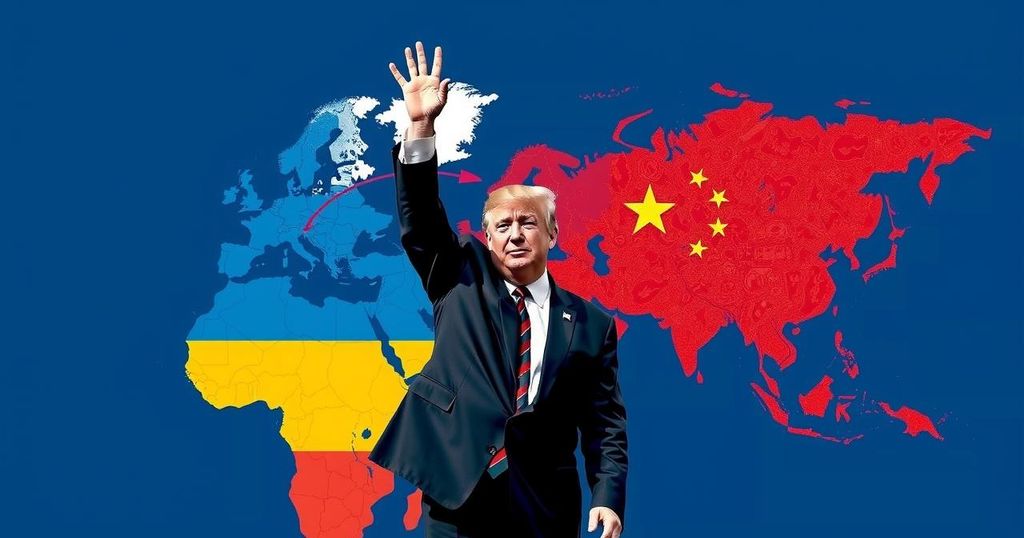Trump’s Election Victory: Implications for Foreign Policy in Ukraine, the Middle East, and China

Donald Trump’s election victory foreshadows a shift in U.S. foreign policy, emphasizing non-interventionism and trade protectionism under his ‘America First’ platform. His proposed strategies include negotiating peace in Ukraine, reassessing NATO commitments, and adopting a tougher stance on China, which could significantly impact global security and diplomatic relations.
The recent victory of Donald Trump in the presidential election signifies a potential realignment of U.S. foreign policy with implications for various geopolitical regions including Ukraine, the Middle East, and relations with China. Trump’s past assertions suggest a preference for non-intervention and trade protectionism, embodied in his “America First” mantra. He has indicated a focus on negotiating peace, particularly in the Russia-Ukraine conflict, while holding a skeptical stance towards NATO and seeking to revert to his administration’s Middle East policies. Furthermore, Trump’s approach to China is likely to involve tougher stances, especially concerning trade and military assistance to Taiwan, reflecting a continuity of his previous aggressive diplomatic tactics. Regarding Ukraine, Trump has stated the capability to resolve the war with Russia within a day, although his lack of specifics raises questions about his actual strategy. His advisers propose conditional military aid linked to negotiations, with implications that may favor Russia. Concerns regarding NATO’s future are prevalent, given Trump’s past criticisms and the potential for the U.S. to reassess its commitments to the alliance. In the Middle East, Trump’s promises to end conflicts have been juxtaposed with a complex legacy of support for Israel that arguably alienated the Palestinians. His administration’s decisions, including recognition of Jerusalem as Israel’s capital, have led to claims of destabilization. It remains uncertain how Trump will navigate the ongoing Israel-Hamas and Israel-Hezbollah conflicts while managing his strong ties with Arab nations. Trump’s policy towards China is of paramount importance in global diplomacy, characterized by tariffs and an aggressive stance during his previous term. His remarks suggesting he would utilize fear of unpredictability to deter China signal a continuation of his hardline approach. This indicates a likely shift away from Biden’s strategy of building coalitions to contain China, favoring direct confrontation instead.
Donald Trump’s electoral success ushers in a phase of anticipated transformation in U.S. foreign policy, reshaping interactions with critical global players. His previous tenure from 2017 to 2021 was marked by contradictions and a tendency towards confrontational diplomacy. His commitment to an ‘America First’ agenda emphasized isolationism and protectionism, challenging long-standing alliances and treating foreign aid as transactional. With wars ongoing in Ukraine and the Middle East, coupled with tensions with China, Trump’s return poses intricate prospects for international relations.
In summary, Donald Trump’s return to the White House is poised to alter U.S. foreign policy significantly, particularly regarding Ukraine, the Middle East, and China. His emphasis on non-intervention, skepticism of NATO, and aggressive trade strategies represent a departure from traditional diplomatic norms, instigating concerns among allies and adversaries alike. The effectiveness of his proposed strategies remains uncertain, as does the balance he will strike between maintaining alliances and asserting American interests.
Original Source: www.bbc.com






